Evidence-Based Practice Report: Nursing Stress in High Risk ICU Unit
VerifiedAdded on 2022/11/14
|11
|3150
|50
Report
AI Summary
This evidence-based practice report addresses the critical issue of nursing stress within Intensive Care Units (ICUs). It highlights the significant role nurses play in healthcare and the challenges they face, particularly stress stemming from workload, patient care, and the ICU environment. The report synthesizes research, including studies on stress management programs, cognitive behavioral therapy, and communication skills training, to justify the need for interventions to reduce stress levels among ICU nurses. It explores the negative impacts of stress on nurses' well-being, patient care quality, and work-family conflict. The report recommends stress management techniques, such as cognitive restructuring, muscular relaxation, and improved communication skills, as effective strategies to enhance nurses' mental health, job satisfaction, and overall performance. It emphasizes the importance of creating supportive work environments and implementing educational programs to equip nurses with the tools they need to manage stress and provide optimal patient care. The report concludes by advocating for the integration of evidence-based practices to improve the quality of life for nurses and enhance patient outcomes.
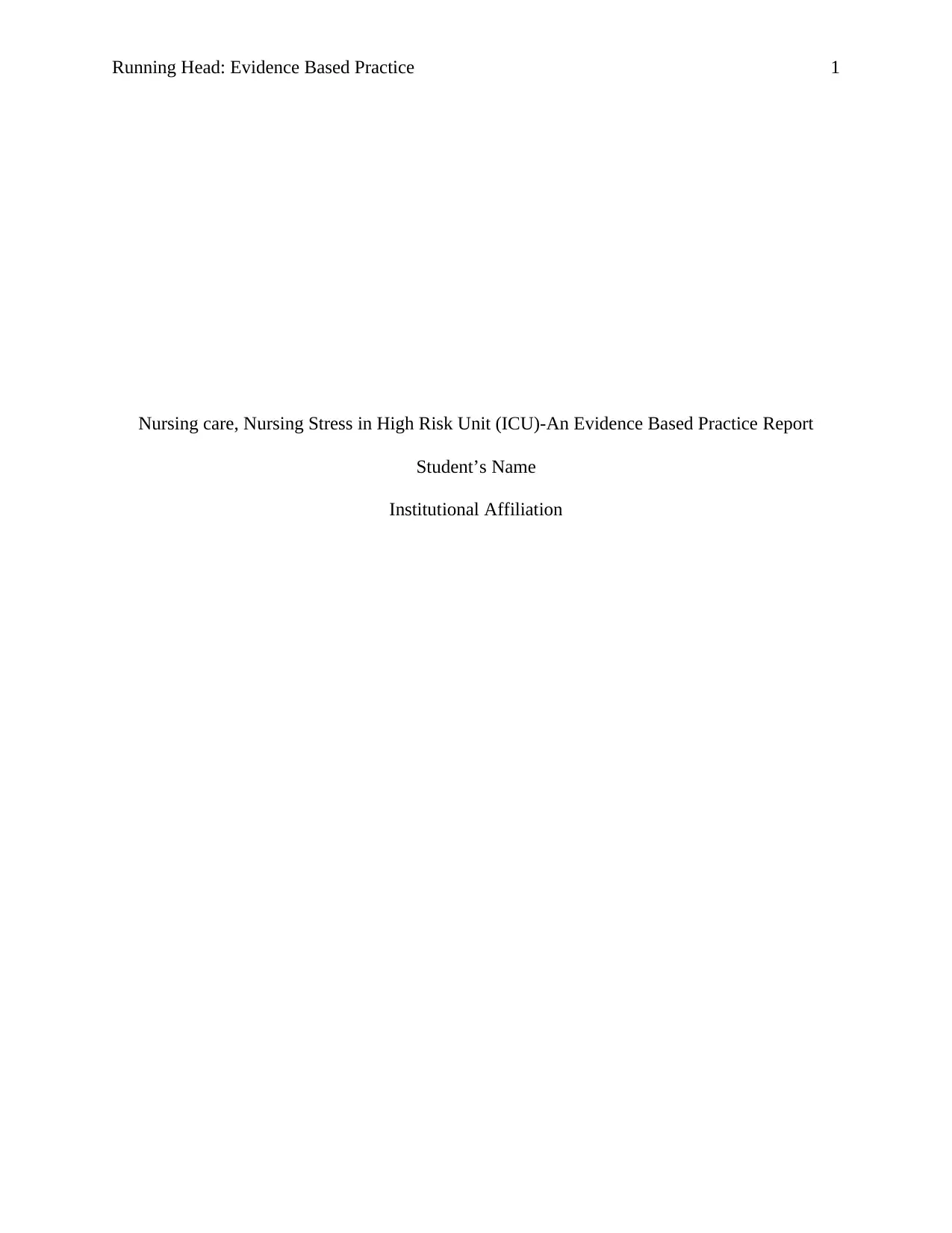
Running Head: Evidence Based Practice 1
Nursing care, Nursing Stress in High Risk Unit (ICU)-An Evidence Based Practice Report
Student’s Name
Institutional Affiliation
Nursing care, Nursing Stress in High Risk Unit (ICU)-An Evidence Based Practice Report
Student’s Name
Institutional Affiliation
Paraphrase This Document
Need a fresh take? Get an instant paraphrase of this document with our AI Paraphraser
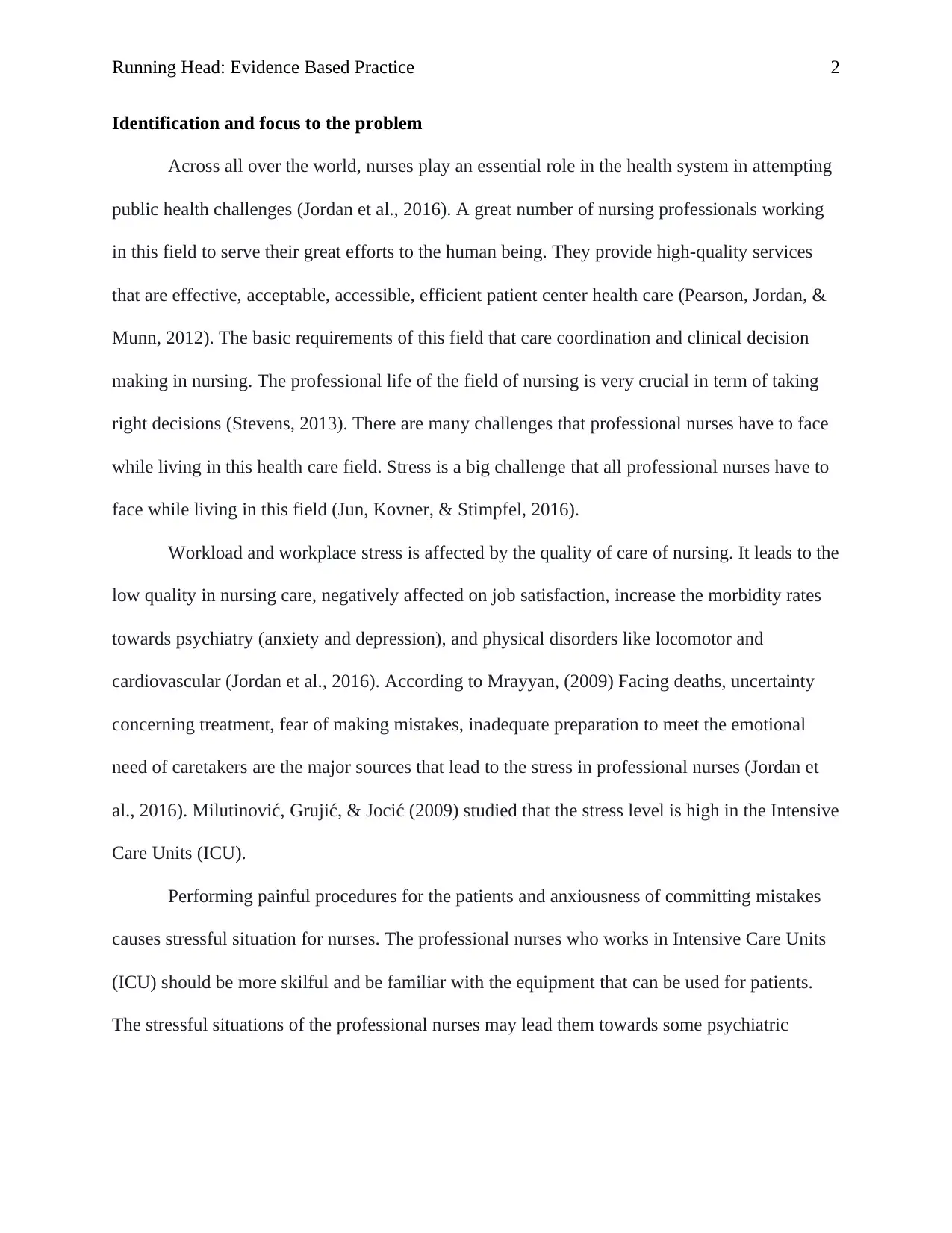
Running Head: Evidence Based Practice 2
Identification and focus to the problem
Across all over the world, nurses play an essential role in the health system in attempting
public health challenges (Jordan et al., 2016). A great number of nursing professionals working
in this field to serve their great efforts to the human being. They provide high-quality services
that are effective, acceptable, accessible, efficient patient center health care (Pearson, Jordan, &
Munn, 2012). The basic requirements of this field that care coordination and clinical decision
making in nursing. The professional life of the field of nursing is very crucial in term of taking
right decisions (Stevens, 2013). There are many challenges that professional nurses have to face
while living in this health care field. Stress is a big challenge that all professional nurses have to
face while living in this field (Jun, Kovner, & Stimpfel, 2016).
Workload and workplace stress is affected by the quality of care of nursing. It leads to the
low quality in nursing care, negatively affected on job satisfaction, increase the morbidity rates
towards psychiatry (anxiety and depression), and physical disorders like locomotor and
cardiovascular (Jordan et al., 2016). According to Mrayyan, (2009) Facing deaths, uncertainty
concerning treatment, fear of making mistakes, inadequate preparation to meet the emotional
need of caretakers are the major sources that lead to the stress in professional nurses (Jordan et
al., 2016). Milutinović, Grujić, & Jocić (2009) studied that the stress level is high in the Intensive
Care Units (ICU).
Performing painful procedures for the patients and anxiousness of committing mistakes
causes stressful situation for nurses. The professional nurses who works in Intensive Care Units
(ICU) should be more skilful and be familiar with the equipment that can be used for patients.
The stressful situations of the professional nurses may lead them towards some psychiatric
Identification and focus to the problem
Across all over the world, nurses play an essential role in the health system in attempting
public health challenges (Jordan et al., 2016). A great number of nursing professionals working
in this field to serve their great efforts to the human being. They provide high-quality services
that are effective, acceptable, accessible, efficient patient center health care (Pearson, Jordan, &
Munn, 2012). The basic requirements of this field that care coordination and clinical decision
making in nursing. The professional life of the field of nursing is very crucial in term of taking
right decisions (Stevens, 2013). There are many challenges that professional nurses have to face
while living in this health care field. Stress is a big challenge that all professional nurses have to
face while living in this field (Jun, Kovner, & Stimpfel, 2016).
Workload and workplace stress is affected by the quality of care of nursing. It leads to the
low quality in nursing care, negatively affected on job satisfaction, increase the morbidity rates
towards psychiatry (anxiety and depression), and physical disorders like locomotor and
cardiovascular (Jordan et al., 2016). According to Mrayyan, (2009) Facing deaths, uncertainty
concerning treatment, fear of making mistakes, inadequate preparation to meet the emotional
need of caretakers are the major sources that lead to the stress in professional nurses (Jordan et
al., 2016). Milutinović, Grujić, & Jocić (2009) studied that the stress level is high in the Intensive
Care Units (ICU).
Performing painful procedures for the patients and anxiousness of committing mistakes
causes stressful situation for nurses. The professional nurses who works in Intensive Care Units
(ICU) should be more skilful and be familiar with the equipment that can be used for patients.
The stressful situations of the professional nurses may lead them towards some psychiatric
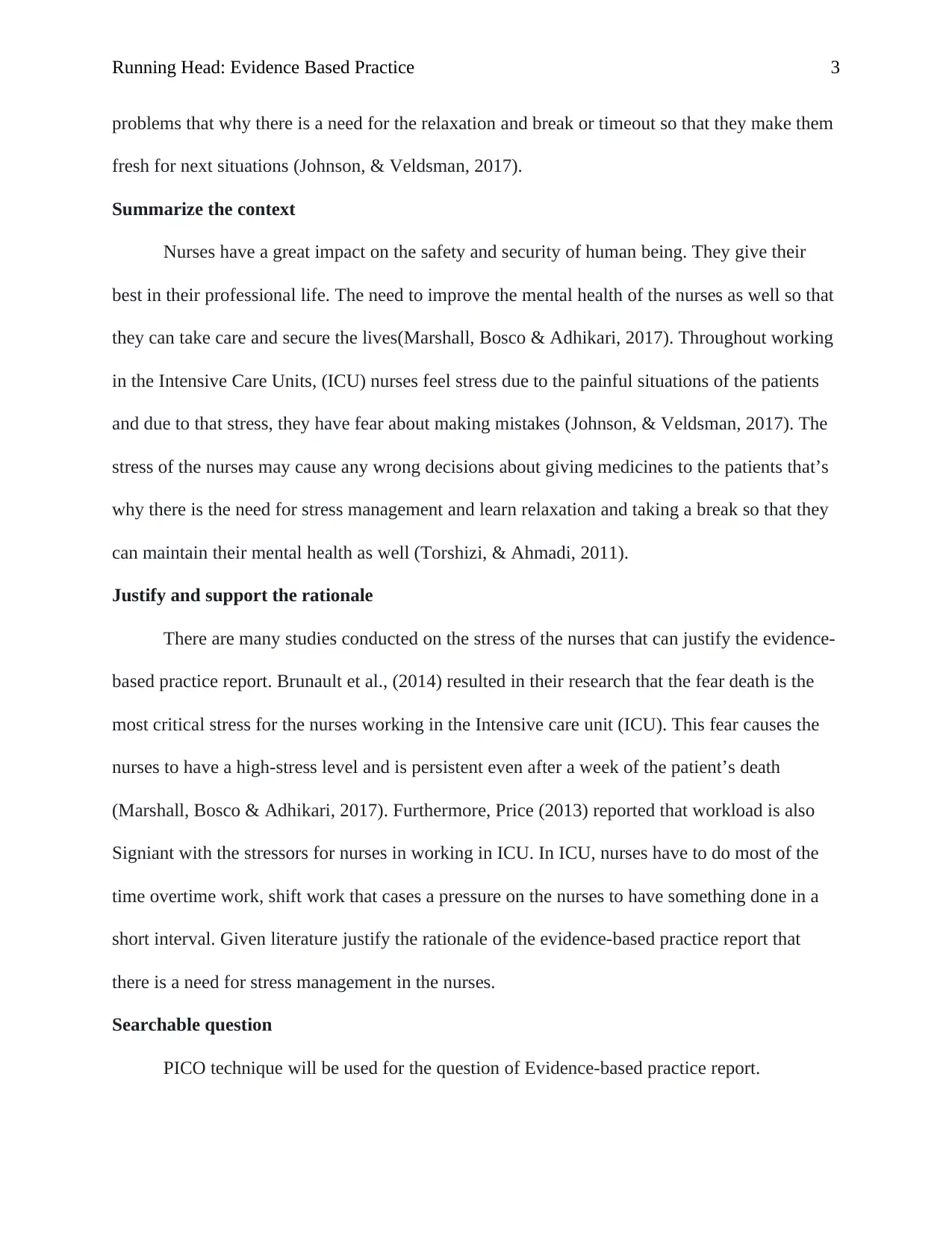
Running Head: Evidence Based Practice 3
problems that why there is a need for the relaxation and break or timeout so that they make them
fresh for next situations (Johnson, & Veldsman, 2017).
Summarize the context
Nurses have a great impact on the safety and security of human being. They give their
best in their professional life. The need to improve the mental health of the nurses as well so that
they can take care and secure the lives(Marshall, Bosco & Adhikari, 2017). Throughout working
in the Intensive Care Units, (ICU) nurses feel stress due to the painful situations of the patients
and due to that stress, they have fear about making mistakes (Johnson, & Veldsman, 2017). The
stress of the nurses may cause any wrong decisions about giving medicines to the patients that’s
why there is the need for stress management and learn relaxation and taking a break so that they
can maintain their mental health as well (Torshizi, & Ahmadi, 2011).
Justify and support the rationale
There are many studies conducted on the stress of the nurses that can justify the evidence-
based practice report. Brunault et al., (2014) resulted in their research that the fear death is the
most critical stress for the nurses working in the Intensive care unit (ICU). This fear causes the
nurses to have a high-stress level and is persistent even after a week of the patient’s death
(Marshall, Bosco & Adhikari, 2017). Furthermore, Price (2013) reported that workload is also
Signiant with the stressors for nurses in working in ICU. In ICU, nurses have to do most of the
time overtime work, shift work that cases a pressure on the nurses to have something done in a
short interval. Given literature justify the rationale of the evidence-based practice report that
there is a need for stress management in the nurses.
Searchable question
PICO technique will be used for the question of Evidence-based practice report.
problems that why there is a need for the relaxation and break or timeout so that they make them
fresh for next situations (Johnson, & Veldsman, 2017).
Summarize the context
Nurses have a great impact on the safety and security of human being. They give their
best in their professional life. The need to improve the mental health of the nurses as well so that
they can take care and secure the lives(Marshall, Bosco & Adhikari, 2017). Throughout working
in the Intensive Care Units, (ICU) nurses feel stress due to the painful situations of the patients
and due to that stress, they have fear about making mistakes (Johnson, & Veldsman, 2017). The
stress of the nurses may cause any wrong decisions about giving medicines to the patients that’s
why there is the need for stress management and learn relaxation and taking a break so that they
can maintain their mental health as well (Torshizi, & Ahmadi, 2011).
Justify and support the rationale
There are many studies conducted on the stress of the nurses that can justify the evidence-
based practice report. Brunault et al., (2014) resulted in their research that the fear death is the
most critical stress for the nurses working in the Intensive care unit (ICU). This fear causes the
nurses to have a high-stress level and is persistent even after a week of the patient’s death
(Marshall, Bosco & Adhikari, 2017). Furthermore, Price (2013) reported that workload is also
Signiant with the stressors for nurses in working in ICU. In ICU, nurses have to do most of the
time overtime work, shift work that cases a pressure on the nurses to have something done in a
short interval. Given literature justify the rationale of the evidence-based practice report that
there is a need for stress management in the nurses.
Searchable question
PICO technique will be used for the question of Evidence-based practice report.
⊘ This is a preview!⊘
Do you want full access?
Subscribe today to unlock all pages.

Trusted by 1+ million students worldwide
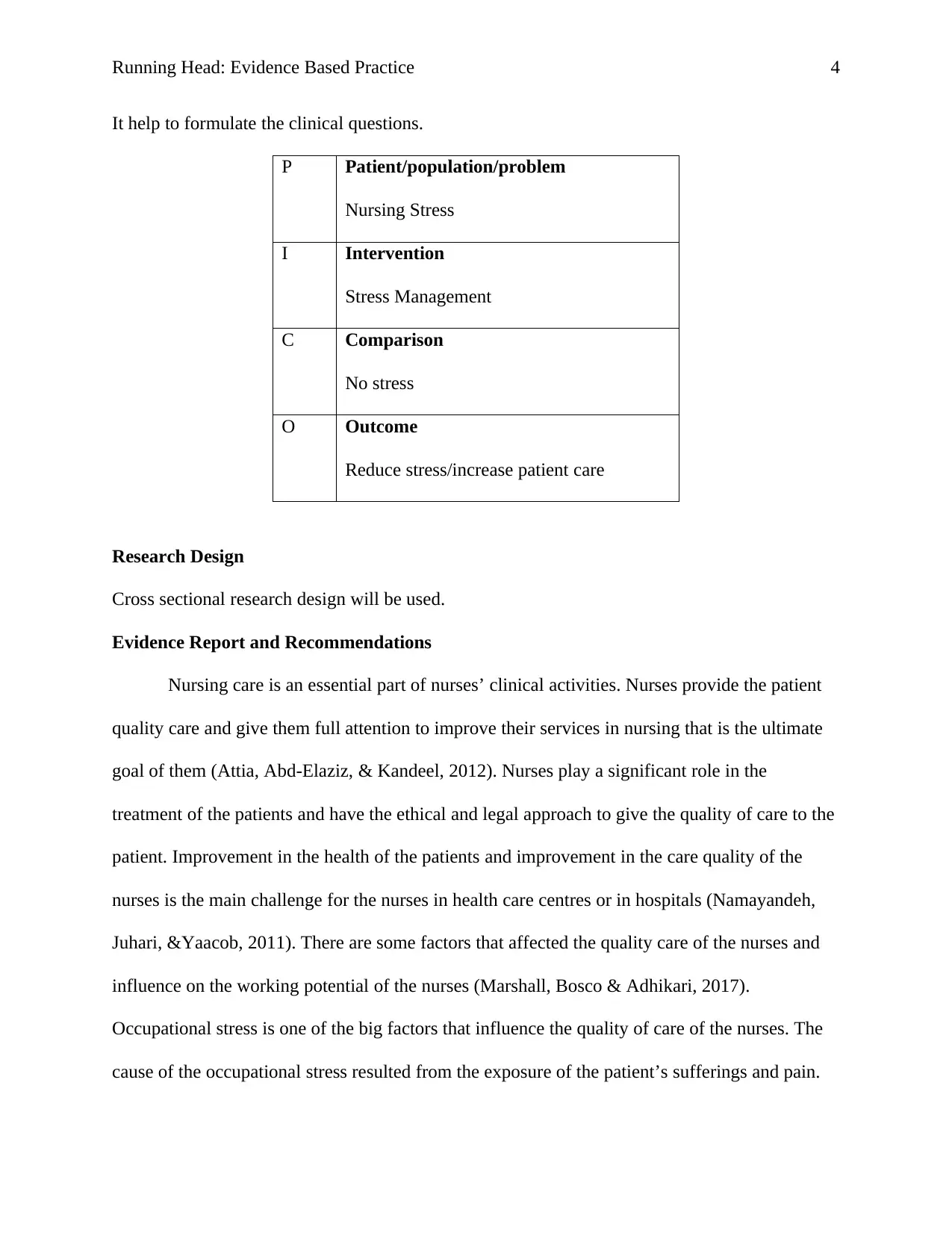
Running Head: Evidence Based Practice 4
It help to formulate the clinical questions.
P Patient/population/problem
Nursing Stress
I Intervention
Stress Management
C Comparison
No stress
O Outcome
Reduce stress/increase patient care
Research Design
Cross sectional research design will be used.
Evidence Report and Recommendations
Nursing care is an essential part of nurses’ clinical activities. Nurses provide the patient
quality care and give them full attention to improve their services in nursing that is the ultimate
goal of them (Attia, Abd-Elaziz, & Kandeel, 2012). Nurses play a significant role in the
treatment of the patients and have the ethical and legal approach to give the quality of care to the
patient. Improvement in the health of the patients and improvement in the care quality of the
nurses is the main challenge for the nurses in health care centres or in hospitals (Namayandeh,
Juhari, &Yaacob, 2011). There are some factors that affected the quality care of the nurses and
influence on the working potential of the nurses (Marshall, Bosco & Adhikari, 2017).
Occupational stress is one of the big factors that influence the quality of care of the nurses. The
cause of the occupational stress resulted from the exposure of the patient’s sufferings and pain.
It help to formulate the clinical questions.
P Patient/population/problem
Nursing Stress
I Intervention
Stress Management
C Comparison
No stress
O Outcome
Reduce stress/increase patient care
Research Design
Cross sectional research design will be used.
Evidence Report and Recommendations
Nursing care is an essential part of nurses’ clinical activities. Nurses provide the patient
quality care and give them full attention to improve their services in nursing that is the ultimate
goal of them (Attia, Abd-Elaziz, & Kandeel, 2012). Nurses play a significant role in the
treatment of the patients and have the ethical and legal approach to give the quality of care to the
patient. Improvement in the health of the patients and improvement in the care quality of the
nurses is the main challenge for the nurses in health care centres or in hospitals (Namayandeh,
Juhari, &Yaacob, 2011). There are some factors that affected the quality care of the nurses and
influence on the working potential of the nurses (Marshall, Bosco & Adhikari, 2017).
Occupational stress is one of the big factors that influence the quality of care of the nurses. The
cause of the occupational stress resulted from the exposure of the patient’s sufferings and pain.
Paraphrase This Document
Need a fresh take? Get an instant paraphrase of this document with our AI Paraphraser
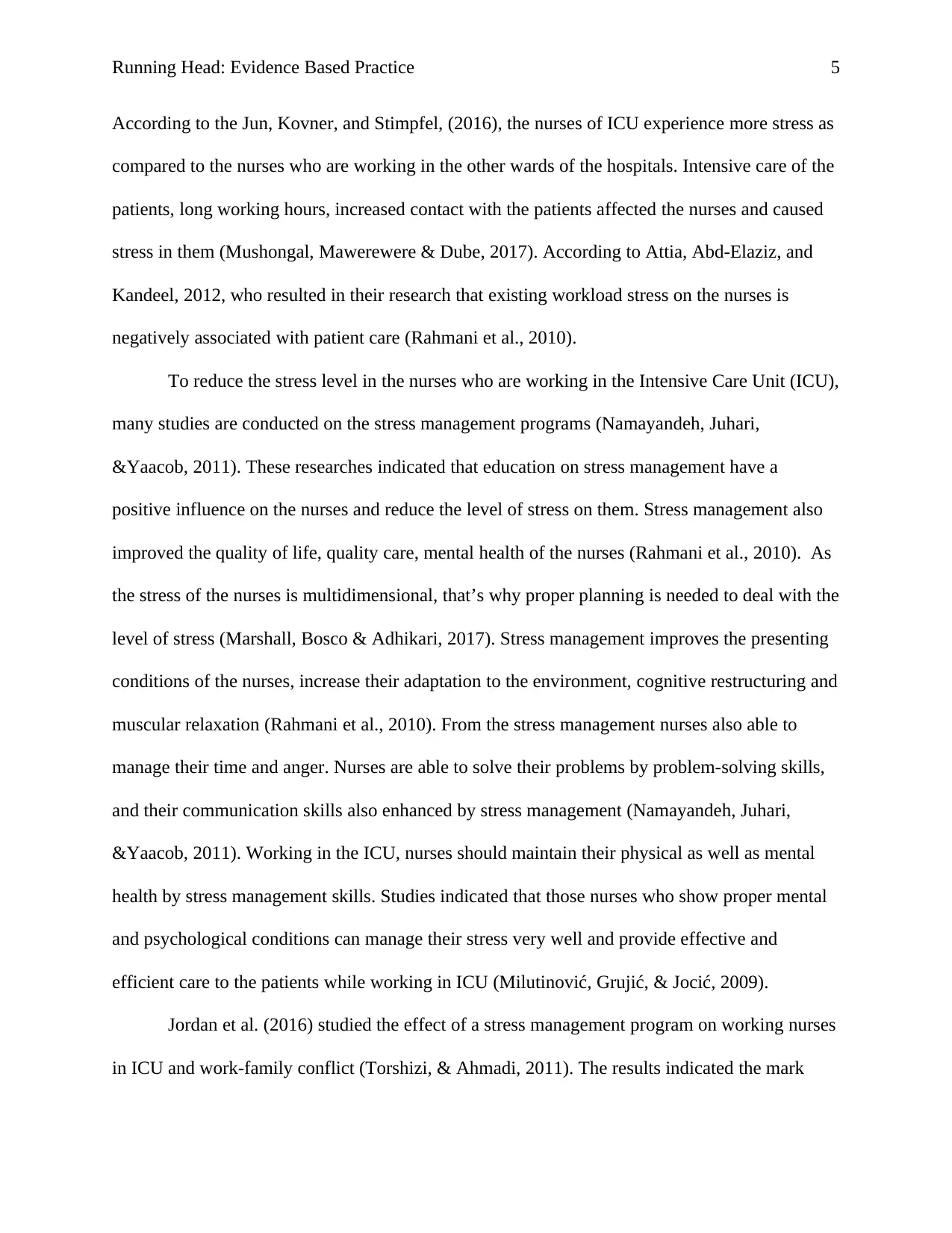
Running Head: Evidence Based Practice 5
According to the Jun, Kovner, and Stimpfel, (2016), the nurses of ICU experience more stress as
compared to the nurses who are working in the other wards of the hospitals. Intensive care of the
patients, long working hours, increased contact with the patients affected the nurses and caused
stress in them (Mushongal, Mawerewere & Dube, 2017). According to Attia, Abd-Elaziz, and
Kandeel, 2012, who resulted in their research that existing workload stress on the nurses is
negatively associated with patient care (Rahmani et al., 2010).
To reduce the stress level in the nurses who are working in the Intensive Care Unit (ICU),
many studies are conducted on the stress management programs (Namayandeh, Juhari,
&Yaacob, 2011). These researches indicated that education on stress management have a
positive influence on the nurses and reduce the level of stress on them. Stress management also
improved the quality of life, quality care, mental health of the nurses (Rahmani et al., 2010). As
the stress of the nurses is multidimensional, that’s why proper planning is needed to deal with the
level of stress (Marshall, Bosco & Adhikari, 2017). Stress management improves the presenting
conditions of the nurses, increase their adaptation to the environment, cognitive restructuring and
muscular relaxation (Rahmani et al., 2010). From the stress management nurses also able to
manage their time and anger. Nurses are able to solve their problems by problem-solving skills,
and their communication skills also enhanced by stress management (Namayandeh, Juhari,
&Yaacob, 2011). Working in the ICU, nurses should maintain their physical as well as mental
health by stress management skills. Studies indicated that those nurses who show proper mental
and psychological conditions can manage their stress very well and provide effective and
efficient care to the patients while working in ICU (Milutinović, Grujić, & Jocić, 2009).
Jordan et al. (2016) studied the effect of a stress management program on working nurses
in ICU and work-family conflict (Torshizi, & Ahmadi, 2011). The results indicated the mark
According to the Jun, Kovner, and Stimpfel, (2016), the nurses of ICU experience more stress as
compared to the nurses who are working in the other wards of the hospitals. Intensive care of the
patients, long working hours, increased contact with the patients affected the nurses and caused
stress in them (Mushongal, Mawerewere & Dube, 2017). According to Attia, Abd-Elaziz, and
Kandeel, 2012, who resulted in their research that existing workload stress on the nurses is
negatively associated with patient care (Rahmani et al., 2010).
To reduce the stress level in the nurses who are working in the Intensive Care Unit (ICU),
many studies are conducted on the stress management programs (Namayandeh, Juhari,
&Yaacob, 2011). These researches indicated that education on stress management have a
positive influence on the nurses and reduce the level of stress on them. Stress management also
improved the quality of life, quality care, mental health of the nurses (Rahmani et al., 2010). As
the stress of the nurses is multidimensional, that’s why proper planning is needed to deal with the
level of stress (Marshall, Bosco & Adhikari, 2017). Stress management improves the presenting
conditions of the nurses, increase their adaptation to the environment, cognitive restructuring and
muscular relaxation (Rahmani et al., 2010). From the stress management nurses also able to
manage their time and anger. Nurses are able to solve their problems by problem-solving skills,
and their communication skills also enhanced by stress management (Namayandeh, Juhari,
&Yaacob, 2011). Working in the ICU, nurses should maintain their physical as well as mental
health by stress management skills. Studies indicated that those nurses who show proper mental
and psychological conditions can manage their stress very well and provide effective and
efficient care to the patients while working in ICU (Milutinović, Grujić, & Jocić, 2009).
Jordan et al. (2016) studied the effect of a stress management program on working nurses
in ICU and work-family conflict (Torshizi, & Ahmadi, 2011). The results indicated the mark
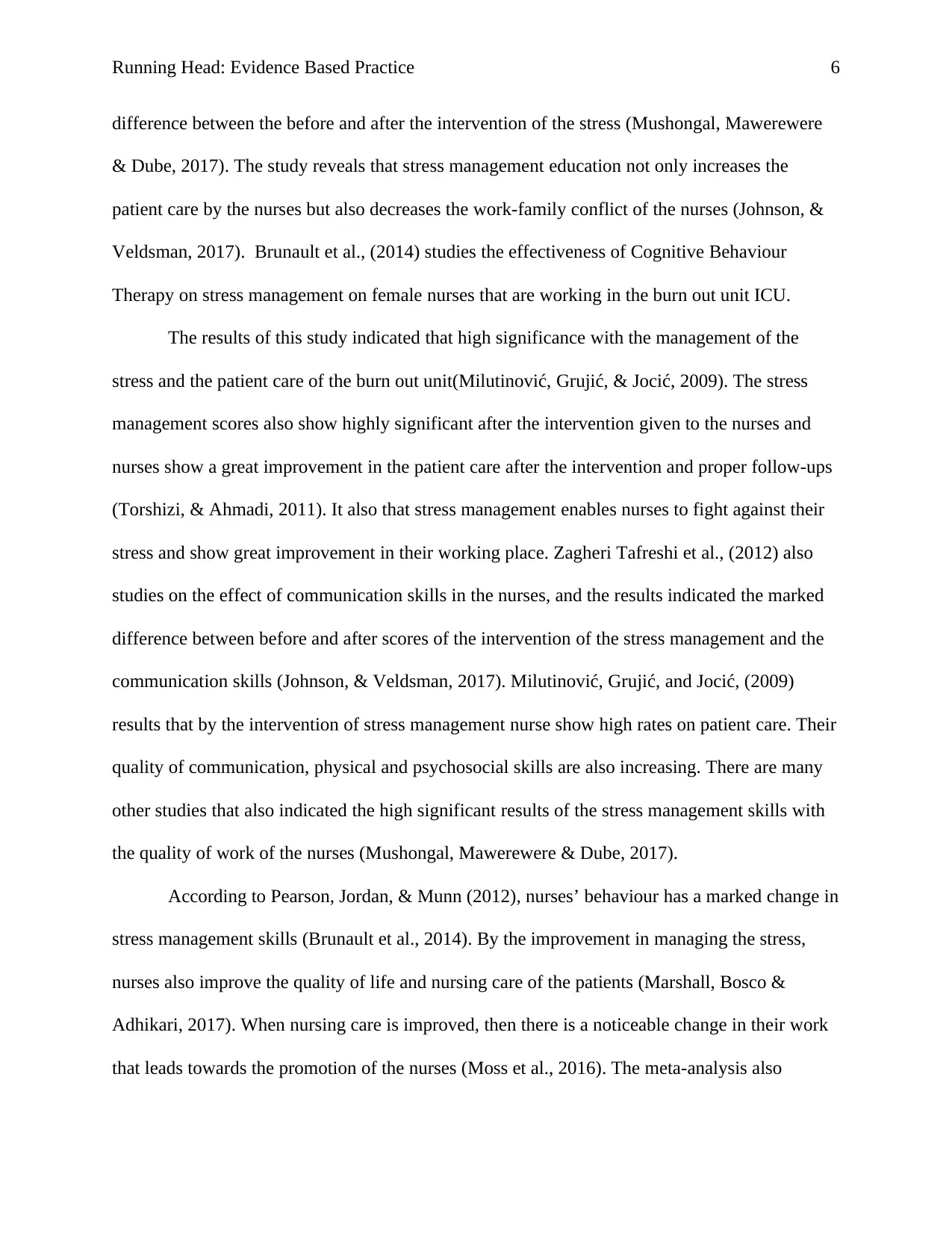
Running Head: Evidence Based Practice 6
difference between the before and after the intervention of the stress (Mushongal, Mawerewere
& Dube, 2017). The study reveals that stress management education not only increases the
patient care by the nurses but also decreases the work-family conflict of the nurses (Johnson, &
Veldsman, 2017). Brunault et al., (2014) studies the effectiveness of Cognitive Behaviour
Therapy on stress management on female nurses that are working in the burn out unit ICU.
The results of this study indicated that high significance with the management of the
stress and the patient care of the burn out unit(Milutinović, Grujić, & Jocić, 2009). The stress
management scores also show highly significant after the intervention given to the nurses and
nurses show a great improvement in the patient care after the intervention and proper follow-ups
(Torshizi, & Ahmadi, 2011). It also that stress management enables nurses to fight against their
stress and show great improvement in their working place. Zagheri Tafreshi et al., (2012) also
studies on the effect of communication skills in the nurses, and the results indicated the marked
difference between before and after scores of the intervention of the stress management and the
communication skills (Johnson, & Veldsman, 2017). Milutinović, Grujić, and Jocić, (2009)
results that by the intervention of stress management nurse show high rates on patient care. Their
quality of communication, physical and psychosocial skills are also increasing. There are many
other studies that also indicated the high significant results of the stress management skills with
the quality of work of the nurses (Mushongal, Mawerewere & Dube, 2017).
According to Pearson, Jordan, & Munn (2012), nurses’ behaviour has a marked change in
stress management skills (Brunault et al., 2014). By the improvement in managing the stress,
nurses also improve the quality of life and nursing care of the patients (Marshall, Bosco &
Adhikari, 2017). When nursing care is improved, then there is a noticeable change in their work
that leads towards the promotion of the nurses (Moss et al., 2016). The meta-analysis also
difference between the before and after the intervention of the stress (Mushongal, Mawerewere
& Dube, 2017). The study reveals that stress management education not only increases the
patient care by the nurses but also decreases the work-family conflict of the nurses (Johnson, &
Veldsman, 2017). Brunault et al., (2014) studies the effectiveness of Cognitive Behaviour
Therapy on stress management on female nurses that are working in the burn out unit ICU.
The results of this study indicated that high significance with the management of the
stress and the patient care of the burn out unit(Milutinović, Grujić, & Jocić, 2009). The stress
management scores also show highly significant after the intervention given to the nurses and
nurses show a great improvement in the patient care after the intervention and proper follow-ups
(Torshizi, & Ahmadi, 2011). It also that stress management enables nurses to fight against their
stress and show great improvement in their working place. Zagheri Tafreshi et al., (2012) also
studies on the effect of communication skills in the nurses, and the results indicated the marked
difference between before and after scores of the intervention of the stress management and the
communication skills (Johnson, & Veldsman, 2017). Milutinović, Grujić, and Jocić, (2009)
results that by the intervention of stress management nurse show high rates on patient care. Their
quality of communication, physical and psychosocial skills are also increasing. There are many
other studies that also indicated the high significant results of the stress management skills with
the quality of work of the nurses (Mushongal, Mawerewere & Dube, 2017).
According to Pearson, Jordan, & Munn (2012), nurses’ behaviour has a marked change in
stress management skills (Brunault et al., 2014). By the improvement in managing the stress,
nurses also improve the quality of life and nursing care of the patients (Marshall, Bosco &
Adhikari, 2017). When nursing care is improved, then there is a noticeable change in their work
that leads towards the promotion of the nurses (Moss et al., 2016). The meta-analysis also
⊘ This is a preview!⊘
Do you want full access?
Subscribe today to unlock all pages.

Trusted by 1+ million students worldwide
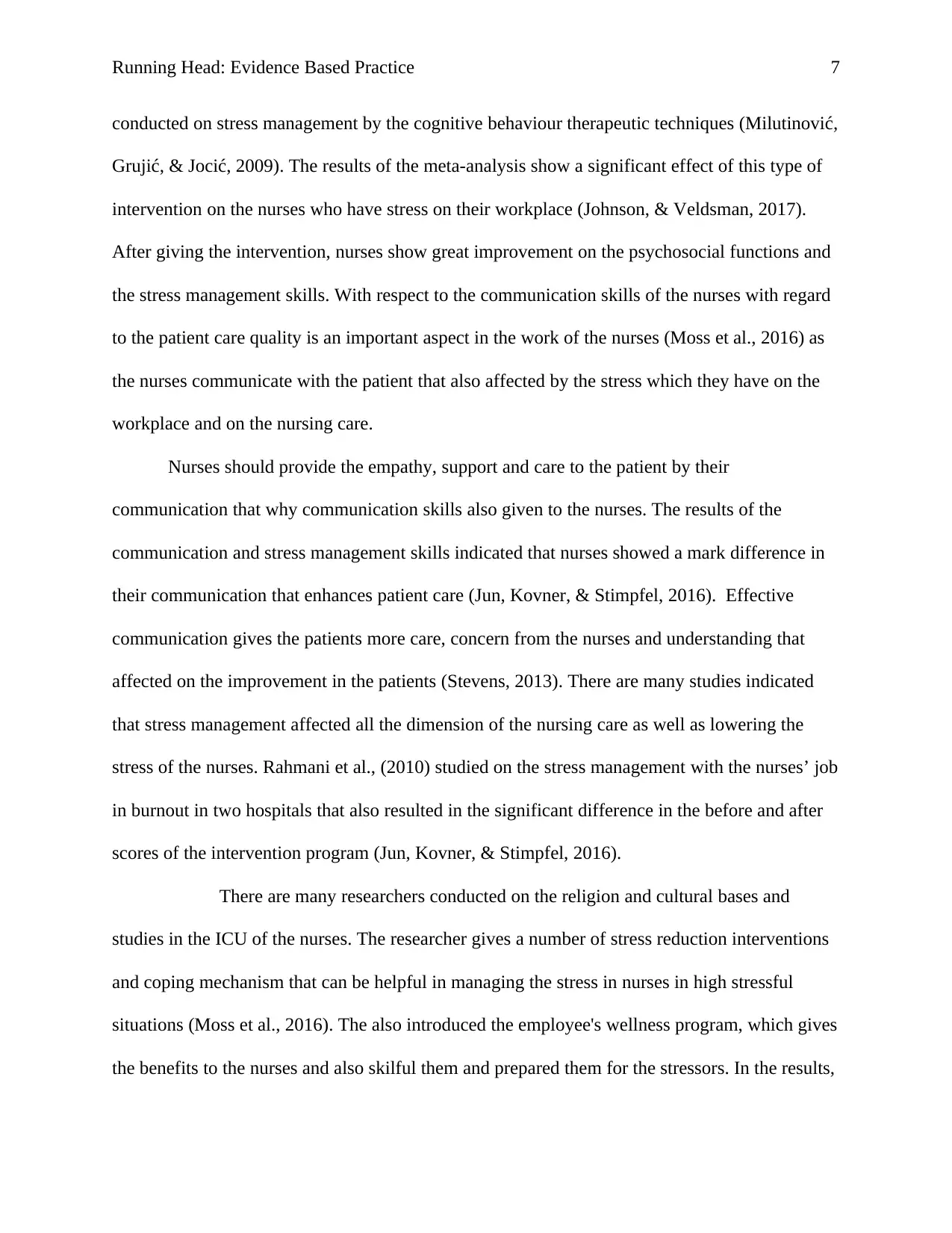
Running Head: Evidence Based Practice 7
conducted on stress management by the cognitive behaviour therapeutic techniques (Milutinović,
Grujić, & Jocić, 2009). The results of the meta-analysis show a significant effect of this type of
intervention on the nurses who have stress on their workplace (Johnson, & Veldsman, 2017).
After giving the intervention, nurses show great improvement on the psychosocial functions and
the stress management skills. With respect to the communication skills of the nurses with regard
to the patient care quality is an important aspect in the work of the nurses (Moss et al., 2016) as
the nurses communicate with the patient that also affected by the stress which they have on the
workplace and on the nursing care.
Nurses should provide the empathy, support and care to the patient by their
communication that why communication skills also given to the nurses. The results of the
communication and stress management skills indicated that nurses showed a mark difference in
their communication that enhances patient care (Jun, Kovner, & Stimpfel, 2016). Effective
communication gives the patients more care, concern from the nurses and understanding that
affected on the improvement in the patients (Stevens, 2013). There are many studies indicated
that stress management affected all the dimension of the nursing care as well as lowering the
stress of the nurses. Rahmani et al., (2010) studied on the stress management with the nurses’ job
in burnout in two hospitals that also resulted in the significant difference in the before and after
scores of the intervention program (Jun, Kovner, & Stimpfel, 2016).
There are many researchers conducted on the religion and cultural bases and
studies in the ICU of the nurses. The researcher gives a number of stress reduction interventions
and coping mechanism that can be helpful in managing the stress in nurses in high stressful
situations (Moss et al., 2016). The also introduced the employee's wellness program, which gives
the benefits to the nurses and also skilful them and prepared them for the stressors. In the results,
conducted on stress management by the cognitive behaviour therapeutic techniques (Milutinović,
Grujić, & Jocić, 2009). The results of the meta-analysis show a significant effect of this type of
intervention on the nurses who have stress on their workplace (Johnson, & Veldsman, 2017).
After giving the intervention, nurses show great improvement on the psychosocial functions and
the stress management skills. With respect to the communication skills of the nurses with regard
to the patient care quality is an important aspect in the work of the nurses (Moss et al., 2016) as
the nurses communicate with the patient that also affected by the stress which they have on the
workplace and on the nursing care.
Nurses should provide the empathy, support and care to the patient by their
communication that why communication skills also given to the nurses. The results of the
communication and stress management skills indicated that nurses showed a mark difference in
their communication that enhances patient care (Jun, Kovner, & Stimpfel, 2016). Effective
communication gives the patients more care, concern from the nurses and understanding that
affected on the improvement in the patients (Stevens, 2013). There are many studies indicated
that stress management affected all the dimension of the nursing care as well as lowering the
stress of the nurses. Rahmani et al., (2010) studied on the stress management with the nurses’ job
in burnout in two hospitals that also resulted in the significant difference in the before and after
scores of the intervention program (Jun, Kovner, & Stimpfel, 2016).
There are many researchers conducted on the religion and cultural bases and
studies in the ICU of the nurses. The researcher gives a number of stress reduction interventions
and coping mechanism that can be helpful in managing the stress in nurses in high stressful
situations (Moss et al., 2016). The also introduced the employee's wellness program, which gives
the benefits to the nurses and also skilful them and prepared them for the stressors. In the results,
Paraphrase This Document
Need a fresh take? Get an instant paraphrase of this document with our AI Paraphraser

Running Head: Evidence Based Practice 8
stress reduction and coping mechanism have a great impact on the working of the nurses, and
after taking information about the employees’ wellness program, there are a large number of ICU
working nurses enrolled in that program (Johnson, & Veldsman, 2017). Educational programs
also introduced in improving the stress related to the workload that gives a great improvement in
the working efficacy of the nurses (Marshall, Bosco & Adhikari, 2017).
The above mentioned all the researches show the great impact of the stress management
program on the stressful situations of the nurses that they have to face in the ICU. The question
of the evidence-based practice report also supported and justified by the given research pieces of
evidence. The question that indicated in the PICO method has great importance for the nurses.
This evidence-based practice research shows the great impact of the stress management
program on the nurses of the ICU. It is recommended that there should be some specific units
like burnout ICU will be studied and in the next reports that have in view for the purpose of the
evidence-based practices reports.
stress reduction and coping mechanism have a great impact on the working of the nurses, and
after taking information about the employees’ wellness program, there are a large number of ICU
working nurses enrolled in that program (Johnson, & Veldsman, 2017). Educational programs
also introduced in improving the stress related to the workload that gives a great improvement in
the working efficacy of the nurses (Marshall, Bosco & Adhikari, 2017).
The above mentioned all the researches show the great impact of the stress management
program on the stressful situations of the nurses that they have to face in the ICU. The question
of the evidence-based practice report also supported and justified by the given research pieces of
evidence. The question that indicated in the PICO method has great importance for the nurses.
This evidence-based practice research shows the great impact of the stress management
program on the nurses of the ICU. It is recommended that there should be some specific units
like burnout ICU will be studied and in the next reports that have in view for the purpose of the
evidence-based practices reports.
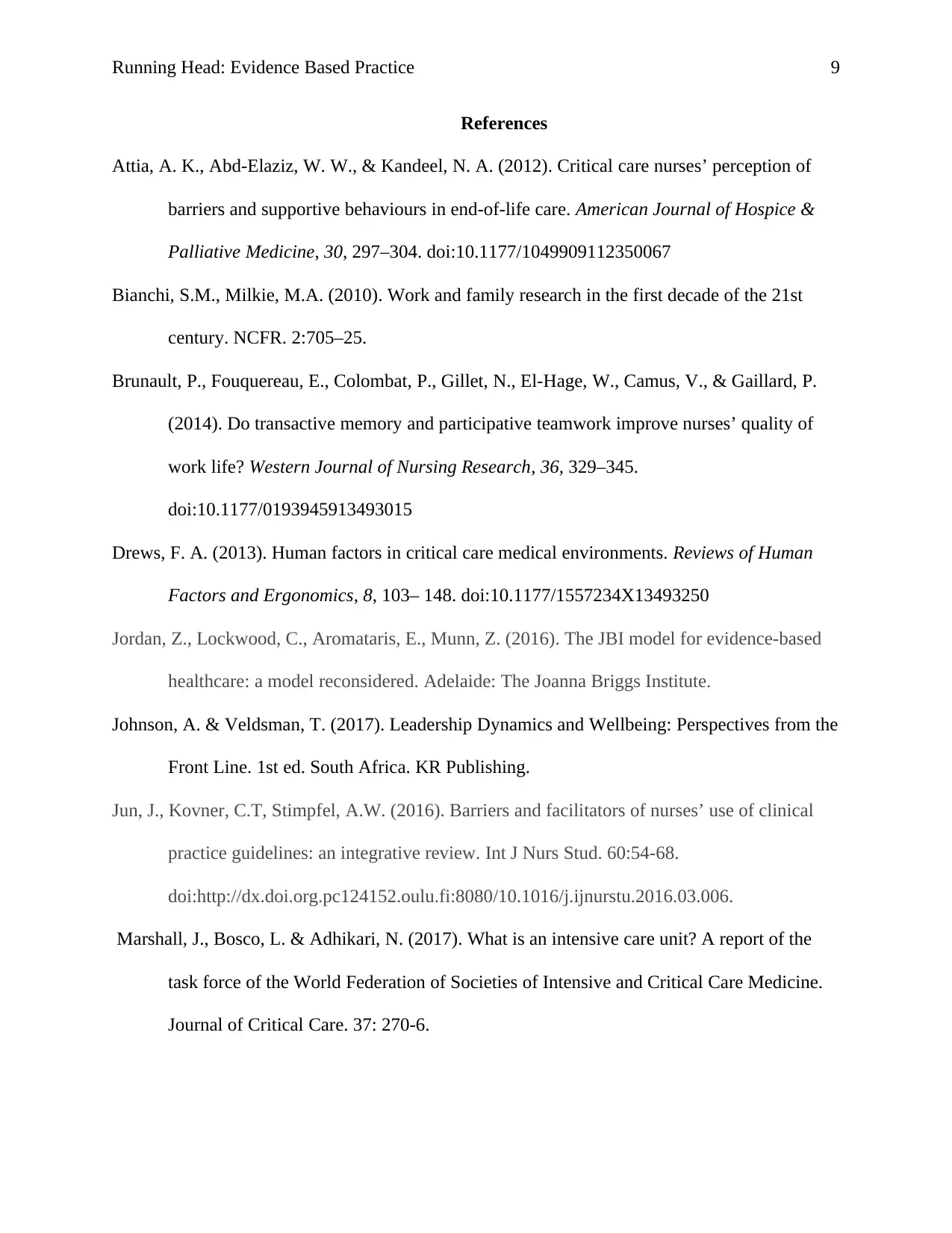
Running Head: Evidence Based Practice 9
References
Attia, A. K., Abd-Elaziz, W. W., & Kandeel, N. A. (2012). Critical care nurses’ perception of
barriers and supportive behaviours in end-of-life care. American Journal of Hospice &
Palliative Medicine, 30, 297–304. doi:10.1177/1049909112350067
Bianchi, S.M., Milkie, M.A. (2010). Work and family research in the first decade of the 21st
century. NCFR. 2:705–25.
Brunault, P., Fouquereau, E., Colombat, P., Gillet, N., El-Hage, W., Camus, V., & Gaillard, P.
(2014). Do transactive memory and participative teamwork improve nurses’ quality of
work life? Western Journal of Nursing Research, 36, 329–345.
doi:10.1177/0193945913493015
Drews, F. A. (2013). Human factors in critical care medical environments. Reviews of Human
Factors and Ergonomics, 8, 103– 148. doi:10.1177/1557234X13493250
Jordan, Z., Lockwood, C., Aromataris, E., Munn, Z. (2016). The JBI model for evidence-based
healthcare: a model reconsidered. Adelaide: The Joanna Briggs Institute.
Johnson, A. & Veldsman, T. (2017). Leadership Dynamics and Wellbeing: Perspectives from the
Front Line. 1st ed. South Africa. KR Publishing.
Jun, J., Kovner, C.T, Stimpfel, A.W. (2016). Barriers and facilitators of nurses’ use of clinical
practice guidelines: an integrative review. Int J Nurs Stud. 60:54-68.
doi:http://dx.doi.org.pc124152.oulu.fi:8080/10.1016/j.ijnurstu.2016.03.006.
Marshall, J., Bosco, L. & Adhikari, N. (2017). What is an intensive care unit? A report of the
task force of the World Federation of Societies of Intensive and Critical Care Medicine.
Journal of Critical Care. 37: 270-6.
References
Attia, A. K., Abd-Elaziz, W. W., & Kandeel, N. A. (2012). Critical care nurses’ perception of
barriers and supportive behaviours in end-of-life care. American Journal of Hospice &
Palliative Medicine, 30, 297–304. doi:10.1177/1049909112350067
Bianchi, S.M., Milkie, M.A. (2010). Work and family research in the first decade of the 21st
century. NCFR. 2:705–25.
Brunault, P., Fouquereau, E., Colombat, P., Gillet, N., El-Hage, W., Camus, V., & Gaillard, P.
(2014). Do transactive memory and participative teamwork improve nurses’ quality of
work life? Western Journal of Nursing Research, 36, 329–345.
doi:10.1177/0193945913493015
Drews, F. A. (2013). Human factors in critical care medical environments. Reviews of Human
Factors and Ergonomics, 8, 103– 148. doi:10.1177/1557234X13493250
Jordan, Z., Lockwood, C., Aromataris, E., Munn, Z. (2016). The JBI model for evidence-based
healthcare: a model reconsidered. Adelaide: The Joanna Briggs Institute.
Johnson, A. & Veldsman, T. (2017). Leadership Dynamics and Wellbeing: Perspectives from the
Front Line. 1st ed. South Africa. KR Publishing.
Jun, J., Kovner, C.T, Stimpfel, A.W. (2016). Barriers and facilitators of nurses’ use of clinical
practice guidelines: an integrative review. Int J Nurs Stud. 60:54-68.
doi:http://dx.doi.org.pc124152.oulu.fi:8080/10.1016/j.ijnurstu.2016.03.006.
Marshall, J., Bosco, L. & Adhikari, N. (2017). What is an intensive care unit? A report of the
task force of the World Federation of Societies of Intensive and Critical Care Medicine.
Journal of Critical Care. 37: 270-6.
⊘ This is a preview!⊘
Do you want full access?
Subscribe today to unlock all pages.

Trusted by 1+ million students worldwide
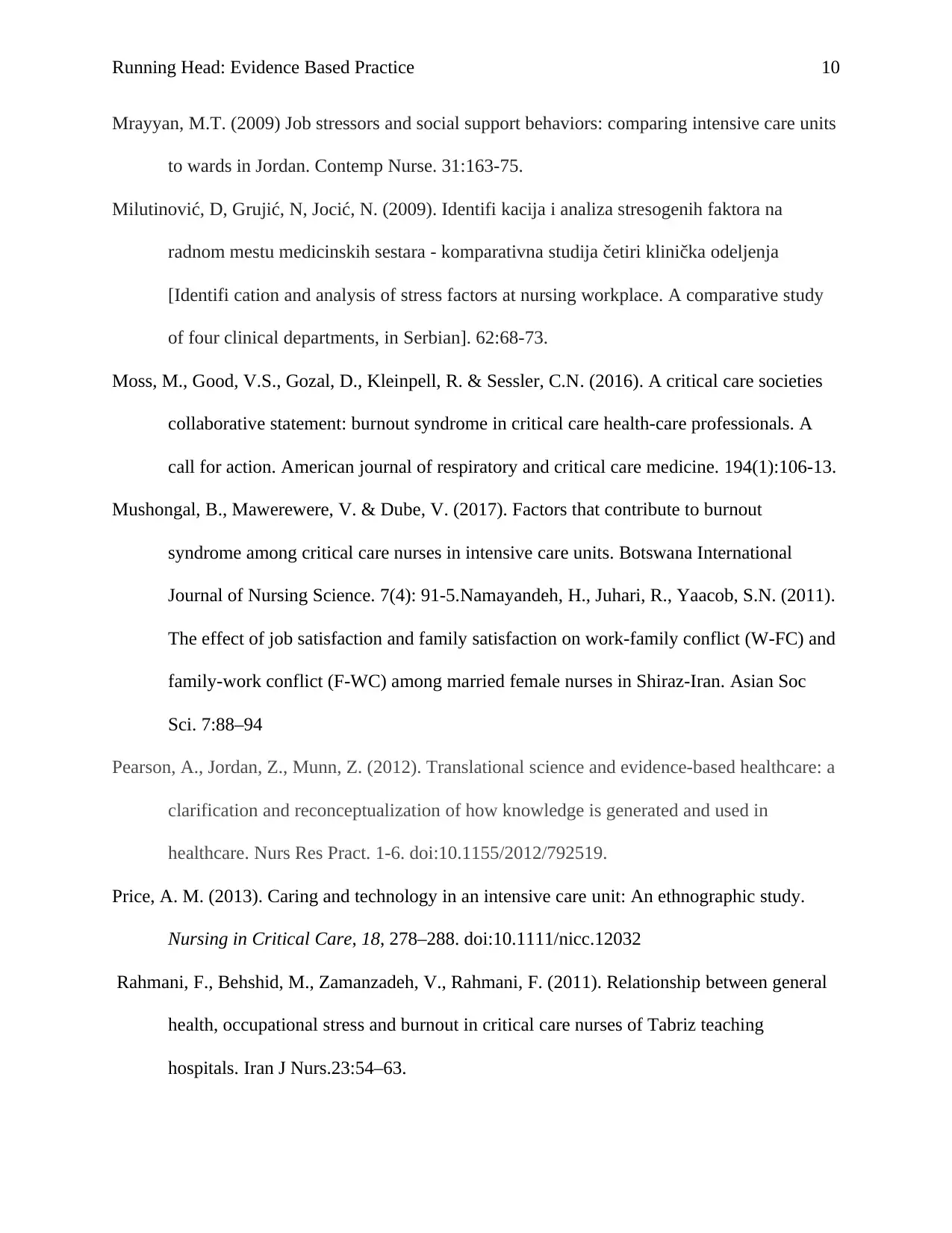
Running Head: Evidence Based Practice 10
Mrayyan, M.T. (2009) Job stressors and social support behaviors: comparing intensive care units
to wards in Jordan. Contemp Nurse. 31:163-75.
Milutinović, D, Grujić, N, Jocić, N. (2009). Identifi kacija i analiza stresogenih faktora na
radnom mestu medicinskih sestara - komparativna studija četiri klinička odeljenja
[Identifi cation and analysis of stress factors at nursing workplace. A comparative study
of four clinical departments, in Serbian]. 62:68-73.
Moss, M., Good, V.S., Gozal, D., Kleinpell, R. & Sessler, C.N. (2016). A critical care societies
collaborative statement: burnout syndrome in critical care health-care professionals. A
call for action. American journal of respiratory and critical care medicine. 194(1):106-13.
Mushongal, B., Mawerewere, V. & Dube, V. (2017). Factors that contribute to burnout
syndrome among critical care nurses in intensive care units. Botswana International
Journal of Nursing Science. 7(4): 91-5.Namayandeh, H., Juhari, R., Yaacob, S.N. (2011).
The effect of job satisfaction and family satisfaction on work-family conflict (W-FC) and
family-work conflict (F-WC) among married female nurses in Shiraz-Iran. Asian Soc
Sci. 7:88–94
Pearson, A., Jordan, Z., Munn, Z. (2012). Translational science and evidence-based healthcare: a
clarification and reconceptualization of how knowledge is generated and used in
healthcare. Nurs Res Pract. 1-6. doi:10.1155/2012/792519.
Price, A. M. (2013). Caring and technology in an intensive care unit: An ethnographic study.
Nursing in Critical Care, 18, 278–288. doi:10.1111/nicc.12032
Rahmani, F., Behshid, M., Zamanzadeh, V., Rahmani, F. (2011). Relationship between general
health, occupational stress and burnout in critical care nurses of Tabriz teaching
hospitals. Iran J Nurs.23:54–63.
Mrayyan, M.T. (2009) Job stressors and social support behaviors: comparing intensive care units
to wards in Jordan. Contemp Nurse. 31:163-75.
Milutinović, D, Grujić, N, Jocić, N. (2009). Identifi kacija i analiza stresogenih faktora na
radnom mestu medicinskih sestara - komparativna studija četiri klinička odeljenja
[Identifi cation and analysis of stress factors at nursing workplace. A comparative study
of four clinical departments, in Serbian]. 62:68-73.
Moss, M., Good, V.S., Gozal, D., Kleinpell, R. & Sessler, C.N. (2016). A critical care societies
collaborative statement: burnout syndrome in critical care health-care professionals. A
call for action. American journal of respiratory and critical care medicine. 194(1):106-13.
Mushongal, B., Mawerewere, V. & Dube, V. (2017). Factors that contribute to burnout
syndrome among critical care nurses in intensive care units. Botswana International
Journal of Nursing Science. 7(4): 91-5.Namayandeh, H., Juhari, R., Yaacob, S.N. (2011).
The effect of job satisfaction and family satisfaction on work-family conflict (W-FC) and
family-work conflict (F-WC) among married female nurses in Shiraz-Iran. Asian Soc
Sci. 7:88–94
Pearson, A., Jordan, Z., Munn, Z. (2012). Translational science and evidence-based healthcare: a
clarification and reconceptualization of how knowledge is generated and used in
healthcare. Nurs Res Pract. 1-6. doi:10.1155/2012/792519.
Price, A. M. (2013). Caring and technology in an intensive care unit: An ethnographic study.
Nursing in Critical Care, 18, 278–288. doi:10.1111/nicc.12032
Rahmani, F., Behshid, M., Zamanzadeh, V., Rahmani, F. (2011). Relationship between general
health, occupational stress and burnout in critical care nurses of Tabriz teaching
hospitals. Iran J Nurs.23:54–63.
Paraphrase This Document
Need a fresh take? Get an instant paraphrase of this document with our AI Paraphraser
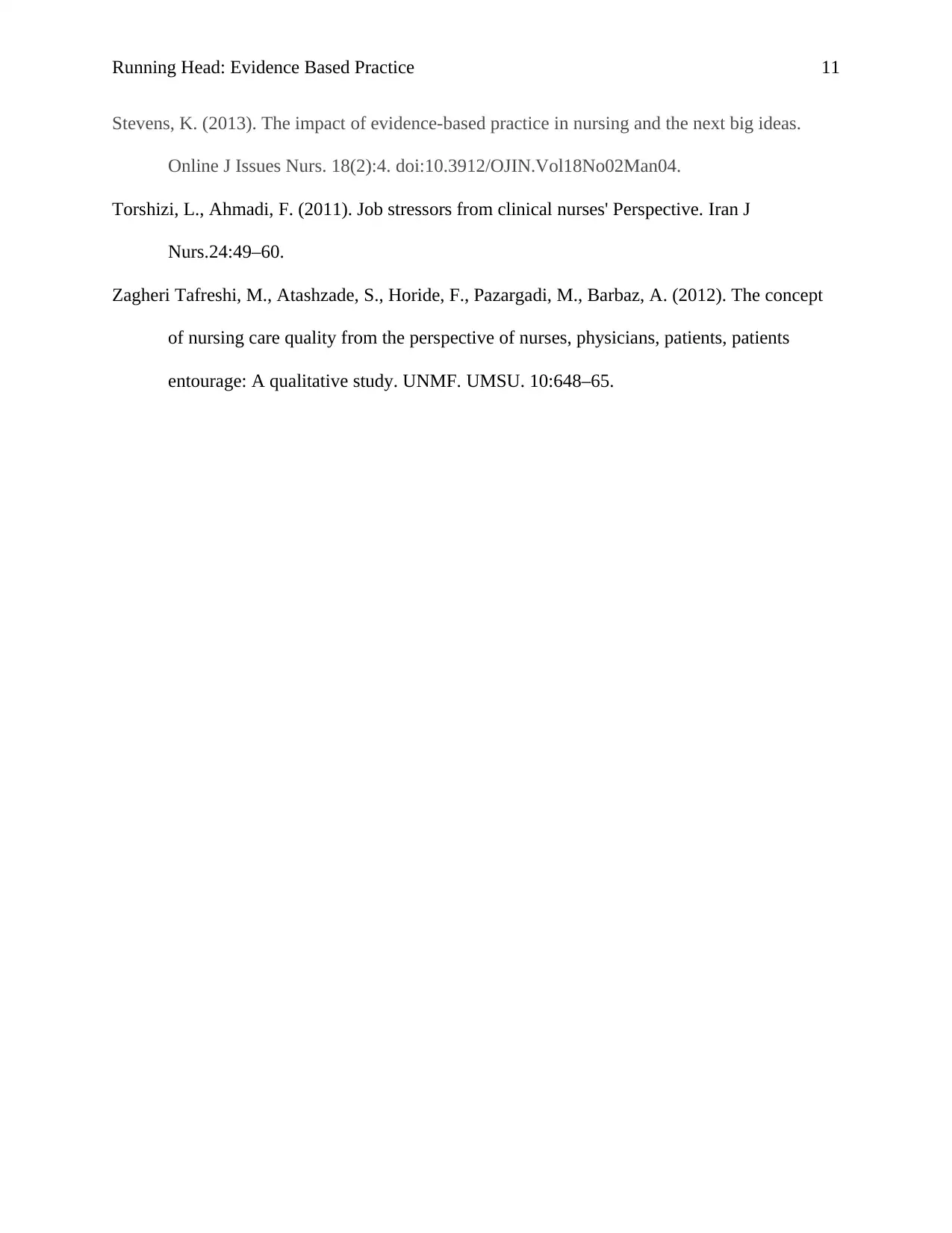
Running Head: Evidence Based Practice 11
Stevens, K. (2013). The impact of evidence-based practice in nursing and the next big ideas.
Online J Issues Nurs. 18(2):4. doi:10.3912/OJIN.Vol18No02Man04.
Torshizi, L., Ahmadi, F. (2011). Job stressors from clinical nurses' Perspective. Iran J
Nurs.24:49–60.
Zagheri Tafreshi, M., Atashzade, S., Horide, F., Pazargadi, M., Barbaz, A. (2012). The concept
of nursing care quality from the perspective of nurses, physicians, patients, patients
entourage: A qualitative study. UNMF. UMSU. 10:648–65.
Stevens, K. (2013). The impact of evidence-based practice in nursing and the next big ideas.
Online J Issues Nurs. 18(2):4. doi:10.3912/OJIN.Vol18No02Man04.
Torshizi, L., Ahmadi, F. (2011). Job stressors from clinical nurses' Perspective. Iran J
Nurs.24:49–60.
Zagheri Tafreshi, M., Atashzade, S., Horide, F., Pazargadi, M., Barbaz, A. (2012). The concept
of nursing care quality from the perspective of nurses, physicians, patients, patients
entourage: A qualitative study. UNMF. UMSU. 10:648–65.
1 out of 11
Related Documents
Your All-in-One AI-Powered Toolkit for Academic Success.
+13062052269
info@desklib.com
Available 24*7 on WhatsApp / Email
![[object Object]](/_next/static/media/star-bottom.7253800d.svg)
Unlock your academic potential
Copyright © 2020–2025 A2Z Services. All Rights Reserved. Developed and managed by ZUCOL.





